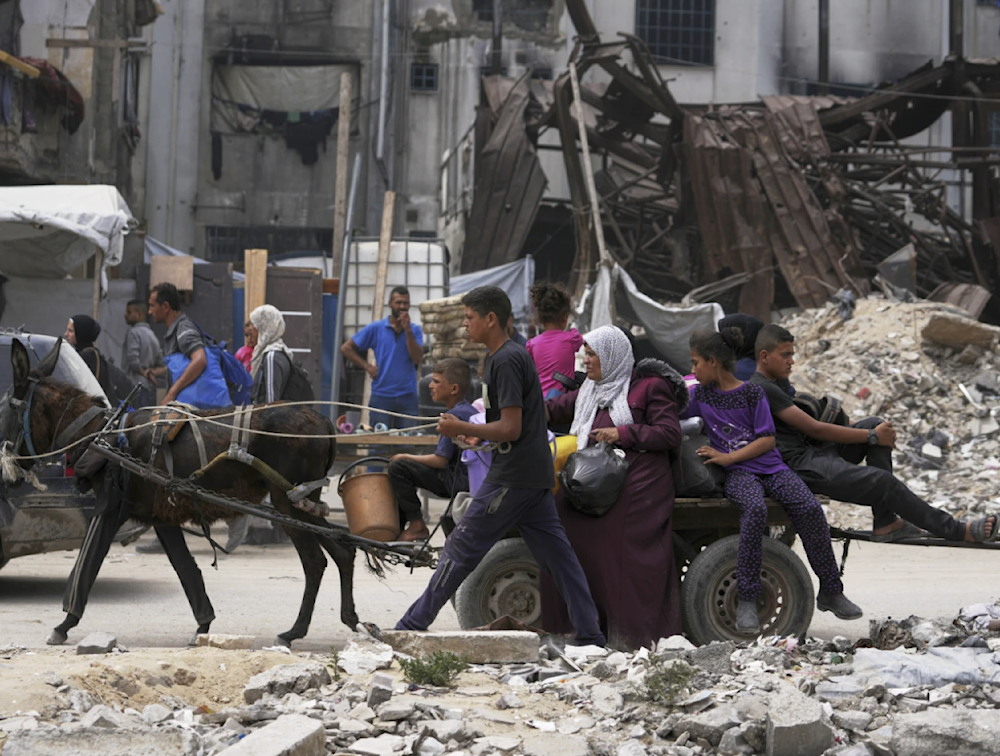Hamas rejects UN resolution, says it fails to meet Palestinian demands
Hamas has rejected the UN Security Council resolution on Gaza, saying it imposes international trusteeship, undermines Palestinian sovereignty, and seeks to fulfill the occupation’s goals under a new framework.
-

Displaced Palestinians fleeing Beit Lahia during Israeli bombings arrive in Jabalia in northern Gaza on May 18, 2025. (AP)
Following the adoption of the UN Security Council resolution on Gaza, the Palestinian resistance movement, Hamas, issued a statement rejecting the decision, saying it does not address the core demands and rights of the Palestinian people, particularly in the Gaza Strip.
The resolution aims to deploy a temporary foreign force to oversee security, support reconstruction, and maintain order in the territory. The draft calls for the force to operate for an initial period of two years, with the possibility of extension depending on developments on the ground.
US President Donald Trump praised the adoption of the resolution, calling the vote a “historic” achievement and confirming his role as head of the newly established Board of Peace for the Palestinian territory.
Resolution fails to address political and humanitarian rights
Hamas said the resolution “does not meet the political and humanitarian demands and rights of the Palestinian people,” but rather “imposes a mechanism to achieve the occupation’s goals, which it failed to achieve through the war of extermination” over the past two years.
The statement emphasized that the decision introduces an international trusteeship over Gaza, which the Palestinian people and their political factions categorically reject. Hamas warned that the resolution seeks to isolate the Gaza Strip from the rest of occupied Palestine and to impose a new reality that undermines Palestinian constants and national rights.
Hamas asserted that such efforts “deprive the Palestinian people of their right to self-determination and the establishment of their independent state with Al-Quds as its capital.”
Disarmament efforts rejected as interference in national matters
The movement also rejected any plans to disarm the Palestinian resistance, reiterating that resistance weapons are “tied to the presence of the occupation.” Hamas insisted that any discussion on this issue “must remain a purely internal Palestinian matter, linked to a political process that guarantees the end of the occupation, the establishment of the Palestinian state, and the exercise of self-determination.”
Read more: US plot for Gaza in shambles amid continued popular support for Hamas
While Hamas acknowledged the role of international forces in monitoring ceasefires, it rejected any expanded mandate that includes internal operations in Gaza. The group said that assigning such forces roles inside the Strip, especially related to disarmament, “removes their neutrality and turns them into a party to the conflict in favor of the occupation.”
Hamas stressed that any international force must be limited to border areas, fully supervised by the United Nations, and work strictly with official Palestinian institutions — without any involvement from the occupation.
Aid and crossings are a right, not a bargaining chip
Regarding humanitarian aid and the opening of crossings, Hamas underlined that these are “fundamental rights of the Palestinian people in the Gaza Strip,” and must not be conditioned or politicized through the mandate of foreign forces.

 3 Min Read
3 Min Read










